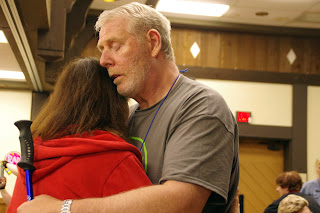Leslie Houston, a stroke survivor, wrote her personal story for the American Heart Association. She feels her story is important to pass on and so do I. You can find other stories like this if you visit the American Heart Association/American Stroke Association sites. There are many stories, and informative articles there about stroke and much about heart attackes and other like issues. Please visit these sites:
Here is her story.
---------------------------------------------------------------------------------------------------------------
| My name is Leslie Houston, I am a stroke survivor. At the time my stroke happened I was on a 9 hour drive. I was going from Garden City, KS to Springfield, MO on my way to see John, a friend of mine. A week earlier we were going to move me to live with him. Halfway around El Dorado, KS, I got a really bad headache. I was about a mile away from El Dorado and have been on this road so many times I knew exactly where I was. This also took me 2 years to remember that I almost drove my car off the road. So I stopped at the park and took 3 aspirin and laid on the ground thinking as soon as the aspirin kicks in, I will hit the road. It was about 1 PM in the afternoon, Oct, 2, 2008. I couldn't do anything. I remember waving at a little girl. I spent the night in my car. The next morning I drove 5 hours. For 2 to 2 1/2 hours I had major visions. I believe the Lord drove me for awhile. There was one area where the only thing I could see is a hole showing the center of the road. Visions mellowed out by the time I got to busier roads. When I made it to John's, he was at work for a while and was mad at me. "Where have you been?" he asked. I said "I am sick, I am sick and I really have a bad head ache." He went and got me some medication and 1 1/2 hours later I told John, "somethings wrong." John took me to Cox Hospital in Springfield, MO. I was there for a week and they sent me to a Hospital in KS for 4 days and wanted to send me to Wy. I remember saying "no, I wanted to be with John." I am very lucky my mother taught me to get educated and I knew to exercise. I went back to Garden City, KS and told my Doc I need to go to school. I explained to my doctor that I had an extreme head ache for many months. I couldn't understand words or talk correctly. As I learned more about stroke victims I saw that we are all dealing with different affects of the condition. I can use my legs and hands while others have lost their ability to do so. Most people don't know I am a Stroke person. The size of the Stroke in my brain is, 7.5 3.6 2.5 cm. I am trying to get Doctors to send Stroke people right out the gate to school or speech classes. Please it is extremely important for people like me. I am now going to Ivinson Memorial Hospital, Speech Language Pathologist, Shelley Barton, M.S., CCC-SLP, I have been seeing her for over 2 years. Now I also see Shelly Coulter, M.S., CCC-SLP, 2 Shelley's. Anyway, Doctors please do this for people. Most of us can't talk, therefore, we are not acknowledged. Thank you for the time to read this, it is important. Thank you, American Heart Association |















